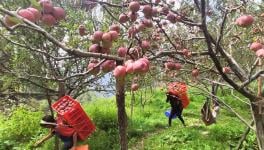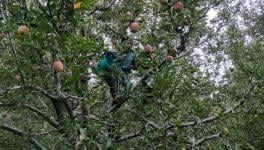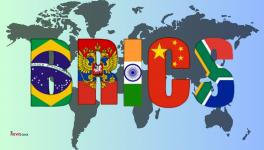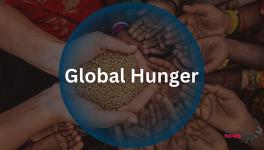Impact of Food Price Rise on Third World Countries
Prof Jayati Ghosh speaks to Newsclick on global price rise and its impact on developing countries, India in particular.
Rough Transcript
Prabir Purkayastha (Prabir): Hello and welcome to Newsclick. Today we have with us Prof. Jayati Ghosh to discuss food prices in the food crisis that is going up here. Jayati, the food crisis has been rising up again. In 2011, the food prices has been rising consistently high What is the impact that is having in terms of global poor, in terms of third world countries, general impact on those who can least afford the rising price of food.
Jayati Ghosh (Jayati): Well it's actually a horrifying impact because it has been happening in the last four years when prices have been very volatile. In periods of globally rising prices there is almost direct transmission of this rising price to the food prices in this developing world. In periods of falling prices, you don't find that downward movement.
Prabir: It's the first time you are seeing in the last decade, that the number of people hungry have really gone up by huge number. It's really 25 percent.
Jayati: This is not proper estimate, we still don't have the hard data to know what has happened to consumption patterns. It's quite evident that there is going to be, I imagine a very very significant impact on nutrition and when we get the actual data in terms of both the nutrition and how much people are eating in terms of calories and the outcome indicators and I think things are going to be much worse than the people imagine.
Prabir: If you look at the consumption baskets it's about say 10 to 12 percent of the basket of goods in the advance country goes for food. But here, it can be as high as anything fifty to seventy percent so actually the effect would be much, really would really be far higher.
Jayati: The poorest, it will be between 50, the bottom two deciles, three deciles, it would be between fifty to seventy percent. Let's say for the next group which is everybody will be below tub 20 percent, it will be below 40 and 50 percent which is huge. What we have found, even little later we have from the latest National Sample Survey, for India, it would be significant increase in the unit value what people are spending for the essentials wheat, rice, dal, sugar all these essential items.
Prabir: If you look at the price rice that has taking place, there are three arguments that is given. One is that imbalance between demand and the supply arguing that the Indian's and the Chinese are eating too much.
Jayati: No that is ridiculous because in fact you look at it globally Indians and Chinese are eating less. The consumption of most the basic food items which the prices have zoomed up like wheat, rice has actually fallen. The aggregate consumption has fallen in China and India. But more generally if you look at global demand and supply, there is really no relation between the increase in food prices and the behaviour of demand and supply. Broadly, they have been more or less in sync. Global demand increases may 4 or 5 percent, global supply increases by 5 or 6 percent. So there should be no major change in prices. If you are looking in terms of FAO data on supply and utilisation
Prabir: So what explains this kind of volatility in the market and also almost tripling of the prices in last four five years.
Jayati: Yes, what we fond is that prices doubled or tripled between January 2007 and mid 2008 then they fell again almost the same level of 2007. then they have been rising again and now we have thirteen months of very very high prices, very prolonged period, a Plato where we have crossed the earlier peak of 2008 and this as I said had huge impact globally but it is not related to real demand and supply. There is one supply factor which is important which is the diversion to the bio fuels. Subsidies on the bio fuels in the United States and in the European Union have meant something 1/3rd of Maize output and half of Maize imports for the European Union. But 40 percent of the Maize output in the US is diverted to the bio fuel production.
Prabir: Coupling of those oil prices in some sense the food prices through the biofuels.
Jayati: Well, that's part of the reason. The other thing is oil prices directly effects the food prices because oil enters directly into cultivation because it's the energy the input cost, the transport of food so when oil prices go up, the food prices also go up. It enters directly. But both oil and food are actually effected by another third factor which has really been in a sense a dominant reason for the price increase and that is the financial activity in global commodity market.
Prabir: Can you explain a little bit because all of us thought that speculation is something that is inherent in the commodity trading. So what's new in this.
Jayati: No, what is very new is that what we now have in the commodity market the activity of financial speculators who have no interest whatsoever in the physical commodity. Earlier in commodity market yes of course there was speculation, but globally in fact, in the international commodity market, that speculation was confined to those who have an interest in the physical holding of commodity market. So large grain traders and people like that, agencies like that would be involved in that. They allowed a large part of futures market in the global market was really because of hedging because you would either be needing let's say you are Mc donalds you need a lots of potato chips. So you hedge potatoes from now. Or you are Cargill you are grain traders. So you hedge your purchases six months from now. What we found now specially after 2006 is of very active involvement of financial companies that have absolutely no interesting in physical holding. This was enabled by the financial regulation in the US in 2000, the commodity futures mordernisation act. It brought in possibility of purely financial players entering commodity markets through a lot of measures, I won't go into the details but there were various measures that allowed them to enter. Now, when the housing market was active there was less incentive to get in to all these new things. But when the housing markets gets slowing down, they are looking for other avenues, they entered commodities and that pushes up the price. That makes commodity even more attractive so more and more people enter. From about 2000, you find there is a big increase in what is called over the counter activities. These over the counter activities double, triple and they really track the futures price which then starts leading the spot price in all these major things. Normally a purely hedging markets would be characterised by what is called backwardation the future prices less than the spot price. Increasingly we have found this during the period of price rise upto 2008 and now we have contago the future prices higher than the spot prices. It's driving up the spot price and that's because there is expectation of future price increase and there is a speculative activity that is driving up the future market.
Prabir: Argument has also been given that there is index traders rather than original grain traders or grain speculators really in some sense oil the futures market. But the index traders only buy long and therefore there is only an upward pressure on the market that is created by the index traders and this is one of the reason for what you called in contago.
Jayati: That's right. The index traders are what I have said the purely financial environment in the market which is not interested in the physical holding of the commodity. Now the world is more complicated than it was say three years ago when the index traders were dominating and they are reason because increasingly as financial players have aware that some regulation is on it's way. You know, the US financial regulation reform bill Dodd Frank has got some measures into control this kind of activity. It's stopping OTC trading, the EU regulation is also planning to stop over the counter trading and various other measures. So now in fact, they are moving into other kinds of ways so that increasingly a kind of financial environment is changing. It's not a very clear picture. It's not any more just the index traders which are driving it up. Now you have a range of others even have the grain companies doing financial trading because there is a lot of profit to be made in it. So Glencore and Cargill are doing financial activity even though they are really commodity traders.
Prabir: Are we seeing in some sense the replay of the housing market more complex instruments created which effectively push up the cost of the housing market and now pushing up the commodity prices?
Jayati: Yes, because it has a direct bearing on the people's life across the world. The housing market just effected the houses in United States and households in United States. Here you are talking about the price of the essentials I mean food and fuel enter into everything and so what you talking about is the artificial raising of the prices of essential commodities then get transmitted globally across the world and effect the poorest people.
Prabir: You have argued in one of the pieces that while the prices rise, the domestic price rises but when it falls, it doesn't fall. Which is what you said. The other issue that comes up is can the countries themselves can do something about the domestic prices countries like India.
Jayati: Absolutely. In fact, you see that's so interesting the recent one pattern across the world. There are some countries that have managed it much better than others. In China for e.g. yes, there has been food inflation. Pork is the big one but I am leaving that out for the time being. But it is still lower than the other inflation. So in China inflationary forces are slightly different, It is not led by food inflation. But in India it is dominated and we have been much less able to prevent that global impact hitting us. There is no reason why that should happen because we are in a position to be able to control domestic food prices. We are in a position where we need not import where unless absolutely required where we can go in for measures that can somehow protects both domestic farmers and producers and consumers from the golbal price. So we should be able to have less of an impact of the price increase. Unfortunately, our government seems to have decided that we should be effected by the global forces. We should allow global forces to impact us. I was reading in the paper today that one of our economic adviser has said that we can not afford global fuel prices and food prices go up and not effect Indian prices. The Indian price has to be effected. My comment when I hear things like this is if all these global prices have to be reflected in India prices, what about the price of labour, wages.
Prabir: Which of course is supposed to be different from global prices.
Jayati: Which is very different from the global price.
Prabir: Also, an interesting view coming from food secure. So investment in actual production of food in domestic.
Jayati: But you know it's again it's not that nothing can be done in situations like this. Malawi is a classic example. Malawi was another one of those typical African countries that was a basket case. It was always in trouble. It was always getting in famine to import food etc. Under world bank pressure, IMF and World Bank it actually got rid of it's strategic grain reserve. What we would would call our food stocks because they said what's the need you will import when it is needed and export the rest. All of that nonsense. So it got rid of it. The next year it had a massive famine. Huge devastation, lot of suffering, massive increase in prices, hunger deaths etc. The World Bank , IMF and everybody told it is because of failure of governments. The usual thing it's because of corruption, crony. It's all your fault. Thereafter, the Malawi regime which is not a great regime in many respects but they took a conscious policy to forget the World Bank, to give subsidies on imports on fertilizers etc., to their farmers and to somehow raise small holder agriculture. Now, they were extremely successful. Once they actually decided to forget the World Bank advise, they became the most rapidly increasing agriculture production in the region. During the last period of food price increase they were exporting to the neighboring countries and they were managed to sustain a very low increase in domestic price for their own consumers.
Prabir: Thank you. That was very interesting as you look at the global markets.
Get the latest reports & analysis with people's perspective on Protests, movements & deep analytical videos, discussions of the current affairs in your Telegram app. Subscribe to NewsClick's Telegram channel & get Real-Time updates on stories, as they get published on our website.
























